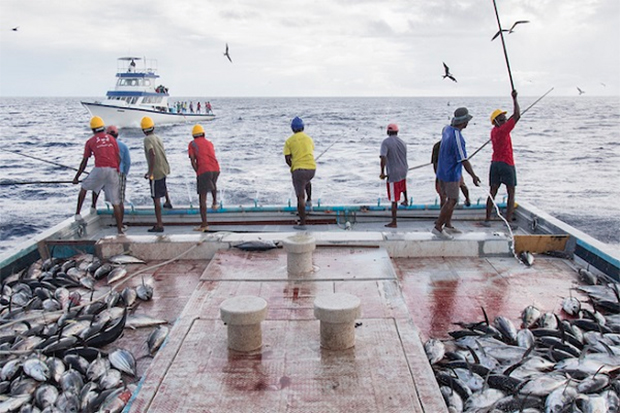Malé, Maldives – The government of Maldives has expressed disappointment after the Indian Ocean Tuna Commission Special Session which focused on the sustainability of the yellowfin tuna fishery ended without revised measures on rebuilding stocks.
The Fisheries Minister of Maldives, Zaha Waheed said that the stock is overfished and conservation must take priority with all fleets in the Indian ocean compromising to save yellowfin tuna stock.
The EU and Maldives both presented conservation measures, the EU proposal would result in 6% less yellowfin caught in 2021 compared with 2014 levels, while the Maldives proposal would cause a decrease of 14%. This is much close to the recommended number 20% which was proposed by the Global Tuna Alliance, an independent group of retailers and supply-chain companies, working together to ensure tuna is harvested the highest standards of environmental performance and social responsibility.
However, neither propose to reduce the use of fish-aggregating devices (FAD)s, which is a major factor that reduce the tuna population. Maldives exclusively uses pole and line fishing, catching individual fish while EU and other rich countries use “monster, factory-boats and sweep up everything that moves” as phrased by Former President and current Speaker of the Maldives, Mohamed Nasheed.
The EU is the biggest harvester of yellowfin tuna in the Indian Ocean. The Guardian reports that EU nations, specifically Spain and France have a fleet of 43 fishing vessels that use FADs to cast nets which catch a large quantity, including by-catch that often consists of young tuna that negatively affects the tuna population. In 2019, the EU is reported to have caught 70,000 tonnes of yellowfin tuna while the South Asian nations of Sri Lanka and Maldives caught 44,000 respectively.
Although Maldives and EU did not address the FAD reduction in their proposals, Kenya and Sri Lanka submitted proposals tackling this issue.
While director general of the Maldives fisheries ministry and vice-chair of the IOTC, Adam Ziyad called the measures proposed by the EU as a “band-aid measure” and calling out the EU of not being sincere in their efforts, Nirmal Shah, former chair of Seychelles Fishing Authority and present chief executive of Nature Seychelles took a harsher approach, accusing the EU of hypocrisy and neocolonialism.
Greenpeace UK accused the governments of failing the oceans and tweeted that the system for protecting the oceans is broken, with greedy industry-dominated talks.
Minister of State for Pacific and the Environment of the UK, Zac Goldsmith addressed this and said that the UK supports the reduction of harvests by a large margin like the Maldives, but were outvoted.
The Honorary Consul of Germany to the Maldives has also encouraged EU to now honour the Maldivian way of fishing by reducing EU quotes in IOT and void taxes for imports and fulfill it’s own sustainability goals in a tweet by Dr. Farah Faizal encouraging leading nations to prioritize sustainability and ocean health for upcoming United Nations Climate Change Conference (COP26) meeting.
Local and international NGOs have applauded the leadership the Maldivian delegation portrayed in the meeting. The next meeting is scheduled in June 2021.





